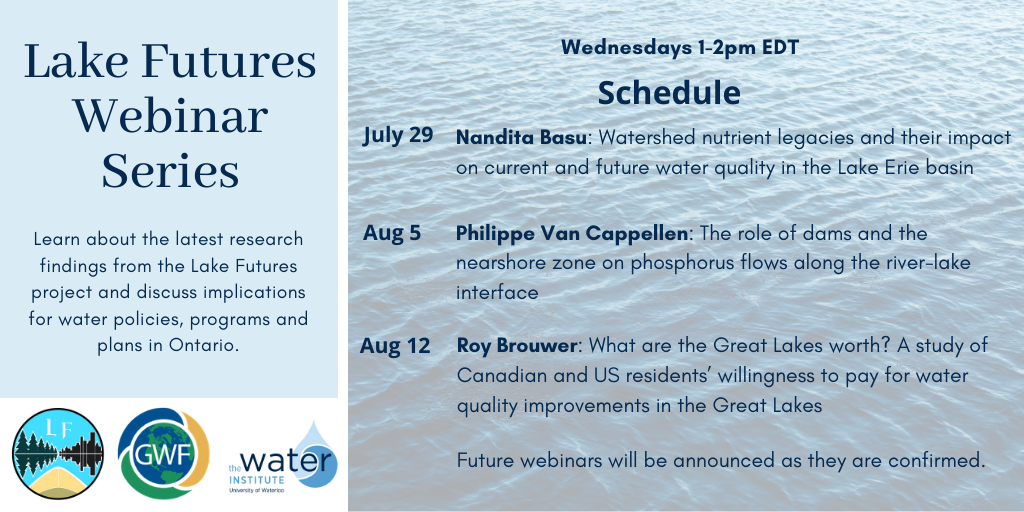
The Lake Futures team is excited to announce the launch of a new webinar series. This series will be an opportunity for the academic and non-academic community to engage with Lake Futures researchers, as they share their latest research findings and discuss implications for water policies, programs, and plans in Ontario.
Webinars will be offered weekly, on Wednesdays from 1-2pm EDT, beginning July 29th. Webinars will include a 30-minute presentation, followed by a 30-minute discussion period. Join the conversation, register today!
Lake Futures Webinar Series Calendar
July 29th 1-2pm EDT

Nandita Basu, PI of Lake Futures,Associate Professor in Civil and Environmental Engineering and Earth and Environmental Sciences, Director of the Collaborative Water Program
Watershed Nutrient Legacies and their Impact on Current and Future Water Quality in the Lake Erie Basin
With increasingly frequent and severe algal blooms in the Great Lakes, all levels of government and stakeholders have been engaged in developing policies and management solutions to reduce nutrient loading to the lakes. The term ‘legacy nutrients’ has been used to describe the amount of nutrients that have built up in soils over the years and are expected to delay the effect of management solutions. Join Nandita Basu, as she shares the latest research progress and findings on modelling legacy nutrients, N and P, and their impacts on water quality in the Great Lakes region.
August 5th 1-2pm EDT

Philippe Van Cappellen, Canada Excellence Research Chair Laureate in Ecohydrology
The role of dams and the nearshore zone on phosphorus flows along the river-lake interface
With continued concern for eutrophication in the lower Great Lakes, scientists, government and stakeholders continue to work together towards effective management solutions. In these freshwater systems, phosphorus is a main driver of algal blooms. Our ability to manage phosphorus in these systems to improve water quality is limited by our understanding of phosphorus flows and cycling along rivers and into large lakes. Join Philippe Van Cappellen, as he shares the latest research progress on phosphorus flows along the river-large lake continuum and how these are impacted by dams and nearshore biogeochemical cycling.
August 12th 1-2pm EDT

Roy Brouwer, Executive Director, the Water Institute
What are the Great Lakes worth? A study of Canadian and US residents’ willingness to pay for water quality improvements in the Great Lakes
The Great Lakes are immensely valuable, providing economic, social, and environmental benefits to those who live, work, and recreate in the region. But, water quality in the Great Lakes is threatened by human activities, like urban development and agriculture. Managing these threats requires investments, and ultimately poses the question: What are the Great Lakes worth? Join Roy Brouwer, as he seeks to answer this question by sharing research updates on how much Canadian and American residents are willing to pay for water quality improvements in the Great Lakes.
Topics of future webinars in this series will be announced as they are confirmed.